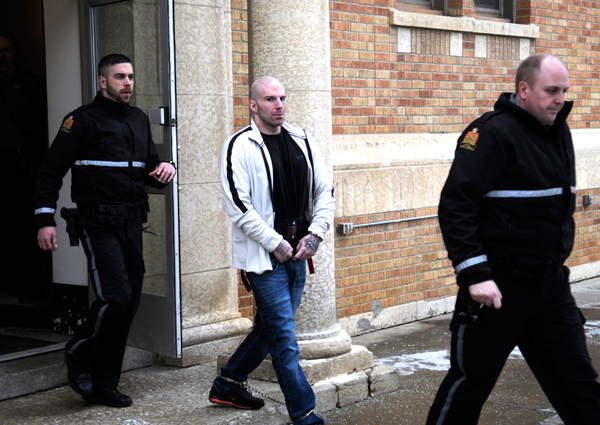
A man accused of killing his cellmate during a 2017 incident at Saskatchewan Penitentiary seemed happy to see him when the two were reunited, correctional officers testified at Court of Queen’s Bench Monday.
Tyler Vandewater has been charged with second-degree murder in the death of Chris Van Camp, who was found dead in his cell on June 7, 2017 just hours after he was returned to the penitentiary. Van Camp had been returned to custody after overdosing while on parole. He had previously served time at Sask. Pen, and was previously cellmates with Vandewater, court heard.
Vandewater sat silently in the prisoner’s box throughout the first day of the proceedings. He was dressed in a pair of jeans and a suit jacket.
Two rows behind him sat Lauren Laithwaite, Van Camp’s mother. It was an emotional first day in court for her, especially seeing the man accused of killing her son.
“It’s really emotional. I’ve waited two and a half years to get here,” she told reporters outside court.
“It’s taken its toll on me for sure.”
Laithwaite hails from Calgary. She intends to be in Prince Albert for the length of the trial, which could stretch on for three weeks.
She said it was important for her to be there “because he was my son. I love him.”
Defence counsel Brian Pfefferle gave a few concessions to the crown and to Justice Scherman on day one of the trial. The two sides filed a lengthy statement of facts as well as a binder full of evidence. Pfefferle said the trial will not hinge on what he called the “usual” issues. Rather, he indicated, his client agrees with much of the evidence. He will be putting forward an argument of self-defence.
Four officers who worked that night or came into contact with the men took the stand on day one of the trial. They spoke of a regular day, with nothing standing out in their minds as out of the ordinary.
The first officer to take the stand had known both Vandewater and Van Camp from prior interactions with them in the penitentiary. He was the officer tasked with finding a bunk for Van Camp, who arrived sometime after 10 p.m. on June 6.
There were no empty cells in the range they were to house Van Camp, which was a gang-affiliated range where members and affiliates of Terror Squad were housed.
The officer approached Vandewater, who had previously double-bunked with Van Camp without incident.
He testified that “everything was good” between the two of them.
“Nothing was out of the ordinary,” he said. There was no history of violence between the two.
On June 6, he said, he approached Vandewater and told him Van Camp was returning to the prison.
While Vandewater “seemed surprised” Van Camp was returning, the officer testified, there were no issues.
Van Camp didn’t have a reputation of violence amongst the guards, court heard.
“He was pretty quiet … we never had a specific incident or issue with him specifically,” the guard said.
A second guard who also testified Monday conducted the intake interview with Van Camp. The interview consists of two parts. The first identified any gang affiliations and the second any risk for self-harm or suicide.
Van Camp indicated he was affiliated with Terror Squad. He didn’t indicate he was at any risk of self-harm. Multiple guards checked if Van Camp had any concerns about residing with Vandewater. He didn’t.
There was no medical exam performed on Van Camp as nursing staff had gone home for the night.
This point stuck out to Laithwaite.
“I’m appalled,” she said.
“He should have been transferred immediately into a medical area.”
She said she doubted his medication, prescribed after his overdose, was with him in his cell that night.
“He needed that medication,” she said.
Laithwaite has sued Correctional Services Canada for the death of her son. That case is ongoing.
The guards observing Van Camp had no concerns. They did say, though, that they noticed Van Camp appeared thinner, and like he had lost weight in the month he was on parole. One officer said he looked “tired.”
They weren’t the only ones. Of the three guards who testified, three accompanied Van Camp to his new cell. One said that Vandewater also remarked on Van Camp’s appearance.
“You look skinny, bro,” she recalled him saying to his cellmate.
The three officers also saw what one called “ a good sign.”
The two cellmates “performed what’s called a ‘bro-up’” the guards said, shaking hands and embracing in a half-hug. They were laughing and talking.
“They were bro-ing it up,” a second guard said.
“No tension at all,” another said.
“They were brothers.”
The two were getting along so well that one of the officers told police on June 8, the day after Van Camp was found in his cell, that learning of the alleged homicide was “truly a shock.”
Once Van Camp was placed in his cell, two of the officers went home. Their shift was done. A third officer had the first half of patrols that night. He said he checked in every hour. He observed Van Camp begin on the top bunk, but by the guard’s second pass Van Camp had switched to the bottom. Van Camp, he said, after the second check, was wrapped in blankets from head to toe. Vandewater was watching TV.
At 2 a.m., he saw what he believed to be Van Camp in the bottom bunk and Vandewater, back to the cell door, at the toilet or sink.
As he traded off patrol duty to the other officer, the fourth witness heard from Monday, the story was the same — Vandewater watching TV, Van Camp lying in bed. The guard’s last check was at 6 a.m. It was the same.
“The range was quiet,” one of the guards said.
“It was like any other night.”
The trial continues Tuesday 10 a.m.

